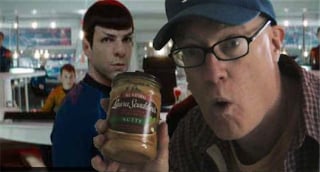Today I have the delight of interviewing fellow blogger, John McManamy. He is an award-winning mental health journalist and author of “Living Well with Depression and Bipolar Disorder: What Your Doctor Doesn’t Tell You … That You Need to Know” (HarperCollins, 2006). His website, “McMan’s Depression and Bipolar Web” is one of the web’s leading information resources on mood disorders, and his blog, “Knowledge is Necessity” explores issues in our own self-knowledge. In addition, John writes for HealthCentral’s BipolarConnect, publishes an email newsletter, and produces educational videos.
John, who was diagnosed with bipolar disorder ten years ago, has worked with DBSA on local, state, and national levels, and is currently serving on the board of NAMI San Diego. In addition to water volleyball, John enjoys daily walks in his mountain environment, playing (rather badly) the didgeridoo, cooking (rather well), and fighting with his cat Bullwinkle over the prime sleeping spot on the mattress.
Question: John, could you outline maybe five steps to help the readers have more fun in their lives?
John: Now there you go, Therese, asking tough questions. Look, I already told you I’m an expert in feeling miserable. Why don’t you ask me to share my secrets on getting high scores on your math SATs while you’re at it? Geesh – okay-okay-okay. I’m thinking …

1. – Enjoy the peanut butter.
As you can see in the picture, here I am trying to explain to Spock the concept of peanut butter. Spock is telling me that peanut butter is not logical (Cardassian tofu apparently is) which is exactly my point. Forget about the bread. Stick a fork in the jar and go for it.
“Enjoy the peanut butter” is my metaphor for living in the present. It comes from an old Zen parable about savoring strawberries as tigers are about to rip you apart. The present is where life is happening, here, right now.
2. – Think small.
Life is about the small things – such as peanut butter. Guess what? If I wish for peanut butter, I get my wish all the time. Okay, I think I’ve exhausted the peanut butter metaphor. Let’s switch to carrots and Bugs Bunny. Scratch that – I hate carrots.
3. – Think big.
Happiness is a very tall order, especially for those of us who are depressed a good deal of the time. We can’t imagine it. We don’t think we deserve it. We have to contend with a lifetime of negative conditioning. Turning our brains around is a mammoth undertaking, and it’s simply not going to happen unless we’re one hundred percent committed to getting it done.
If you’ve decided to work through the weekend to catch up on projects after a whole week of no lunch breaks, you’re not serious. You’re just a no-good slacker. The same holds true if you’re vegging out in front of the TV. Either way – workaholic or couch potato – imagining a life that is different from the one you are leading right now can be the most difficult task in the world. Three words: Dare to imagine.
4. – Try new things.
Chances are your concept of fun is all wrong. Maybe you’re substituting other people’s ideas of fun for your own. Maybe you’re locked in old habits. Then you wonder why you’re not having fun. People who are having fun are being true to themselves. The test: If you don’t feel like a kid again, it’s not fun. You need to try something new. And keep trying.
5. – Play for the sake of play.
Yes, we can enjoy our work and other obligations, but work and play are separate. We often fall into the trap of trying to mix play with something “constructive” as if to justify the reason for play. When that happens, we are working and not playing.
We also tend to bring our ulterior motives into play, such as meeting new people, for whatever reasons. When that happens, we are no longer playing. We’re out of the present moment and into a future that doesn’t exist. To paraphrase the Buddhist masters, “When you play, just play.”
Question: Is there a difference between the creative process … like when you’re writing … and recreation. Do you need both or is one more important than the other?
John: I’m glad you asked that question, Therese. I love writing, and I’m one of the lucky people on earth who has turned my passion into my livelihood. Plus I enjoy the double-whammy effect of writing about a topic I am passionate about. But as much fun as I may be having, I am still working. I have responsibilities, I have deadlines, I have difficult problems to solve. I am working my mind hard, to the point of exhaustion.
I used to confuse my work with play, which meant I never got a break from work. After all, why stop if I’m having so much fun? Then it suddenly dawned on me: If I was enjoying myself so much, why then was I getting depressed so much of the time? Clearly, my brain was telling me something.
I first got an insight into this two-and-a-half years ago when I moved to southern CA from the east coast, and a friend took me to a resort where he goes to play water volleyball. I was a bit hesitant, as I have terrible eyesight and am badly coordinated. Moreover, I have bad memories about being the last one picked on teams as a kid and I didn’t want to relive those awful humiliations.
But once I got in the pool, I experienced far more pleasant childhood memories, the ones we discussed earlier, of being kids on a summer evening. On the drive on the way back, I said to my friend, “You know, I haven’t felt like this since I was five.” Okay, maybe age nine, but five was a very good year for me.
See that “B” on the baseball cap in the picture? I wear that cap practically all the time in tribute to age five. The “B” stands for “Brooklyn Dodgers,” before they moved to LA. When I was five, my dad took me to see a game at Ebbets Field in Brooklyn. I experienced my first ride on a train that day and also went to the top of the Empire State Building. What an amazing day.
That’s what I learned from water volleyball. When I am playing, really playing – not simply cultivating a playful spirit, not simply having fun at work – I am a kid once more. Then the clock hits 3:30, signaling the end of our last session in the pool. Our moms are calling us in for the evening. It’s a moment to savor.
* Click here to subscribe to Beyond Blue and click here to follow Therese on Twitter and click here to join Group Beyond Blue, a depression support group. Now stop clicking.

